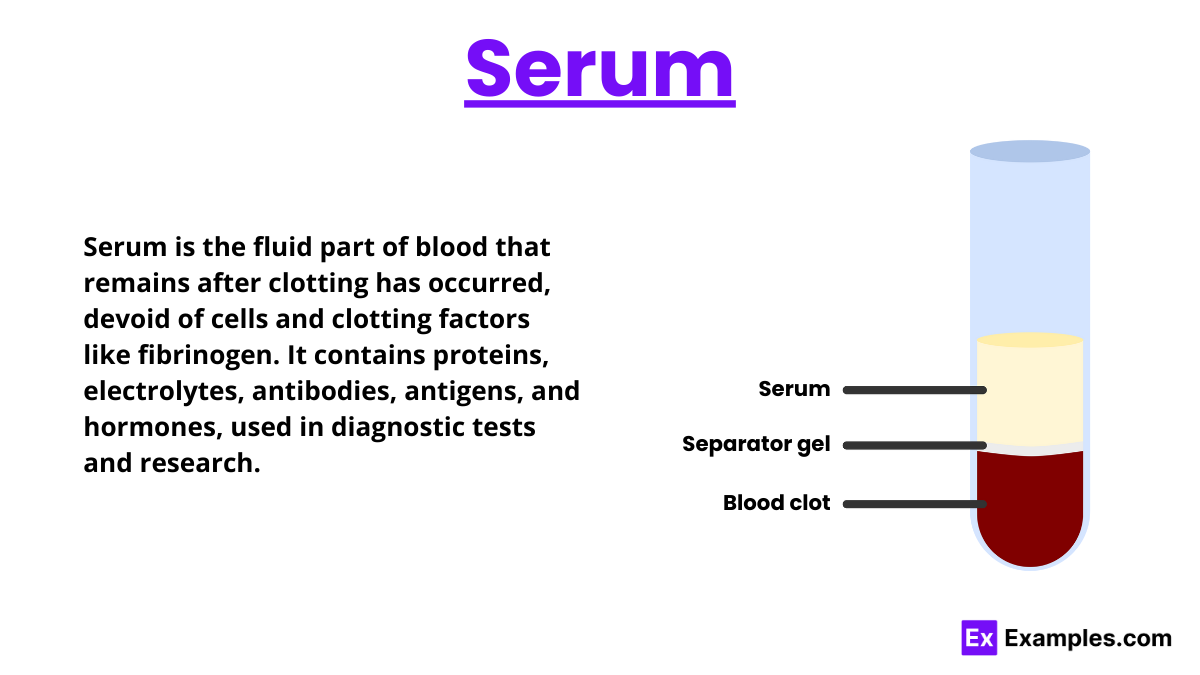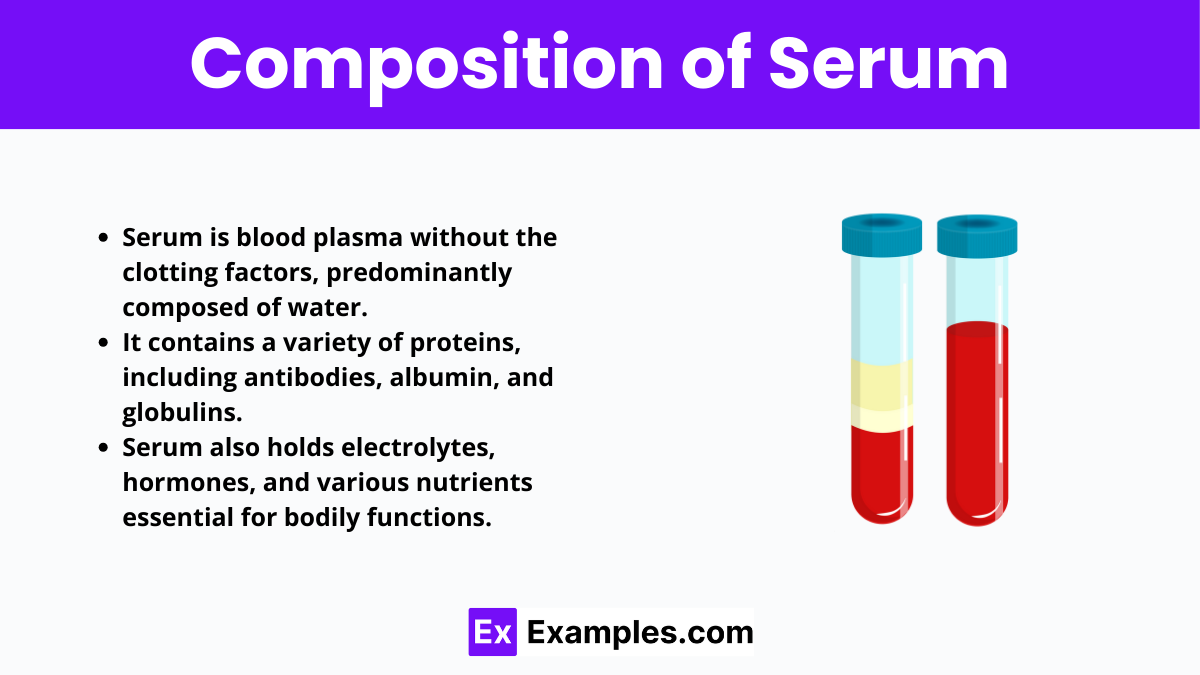What is the primary function of serum in the blood?
To carry oxygen to tissues
To aid in blood clotting
To transport hormones and an
To regulate body temperature


Serum is the clear fluid that remains when blood clots, essentially blood plasma minus clotting factors. Unlike full blood, serum doesn’t include cells or clotting elements like platelets. However, it’s rich in proteins, excluding those involved in clotting, and contains vital substances such as electrolytes, antibodies, antigens, hormones, and any foreign substances like drugs or microbes. Serum plays a crucial role in various medical and research settings due to its comprehensive content excluding blood’s formed elements.
In the medical field, serum is invaluable for its diagnostic capabilities. It aids in detecting infections, autoimmune disorders, and other conditions by analyzing the presence and levels of certain antibodies. Serum tests can also measure enzyme levels, electrolytes, and hormones, assisting in the diagnosis of conditions like liver disease, kidney dysfunction, and hormonal imbalances. Moreover, serum is crucial in immunology for creating vaccines and studying immune responses.

Serum is rich in proteins such as albumin and globulins, which are crucial for maintaining the body’s fluid balance and immune function. These proteins:
The electrolytes in serum, such as sodium, potassium, and chloride, are essential for:
Various hormones circulate in the serum, playing critical roles in regulating bodily functions such as metabolism, growth, and stress responses.
Serum transports nutrients like vitamins and minerals, which are essential for health and wellness.
Serum contributes to health by facilitating the transport of antibodies and nutrients throughout the body. Its rich content of antibodies aids in fighting off infections, while the electrolytes and nutrients it carries are vital for the proper functioning of cells and organs. Serum’s diagnostic potential also allows for early detection and management of diseases, contributing significantly to health maintenance and recovery.
Just as people donate plasma, they can also provide blood from which serum can be obtained. While obtaining serum isn’t the main goal of donating blood, researchers can use the separated serum for various purposes. These include investigating immune responses and creating diagnostic tests.
While a direct “serum deficiency” is not a recognized condition, imbalances in the components of serum, such as proteins, electrolytes, or antibodies, can lead to various health issues. These imbalances can be indicative of underlying health conditions that need to be addressed.
Symptoms vary widely depending on the specific imbalance in serum components, ranging from fatigue and weakness to more serious conditions like edema or immune deficiencies.
Maintaining a balanced diet, staying hydrated, and managing chronic health conditions are key to preventing imbalances in serum components. Regular medical check-ups and serum tests can help detect and address any imbalances early on.

Serum is the clear fluid that remains when blood clots, essentially blood plasma minus clotting factors. Unlike full blood, serum doesn’t include cells or clotting elements like platelets. However, it’s rich in proteins, excluding those involved in clotting, and contains vital substances such as electrolytes, antibodies, antigens, hormones, and any foreign substances like drugs or microbes. Serum plays a crucial role in various medical and research settings due to its comprehensive content excluding blood’s formed elements.
Serum refers to the fluid part of blood that remains after blood has clotted. This amber-colored, transparent liquid is devoid of blood cells and clotting factors, yet it is rich in proteins, hormones, electrolytes, and antibodies. Serum plays a pivotal role in diagnosing and monitoring various diseases and conditions, as it carries a plethora of dissolved constituents critical for bodily functions.
Diagnostic Tool: Serum is extensively used in diagnostic laboratories for a variety of tests. It helps in assessing the function of different organs, detecting diseases, and monitoring the progress of medical conditions.
Immune Response: Serum contains antibodies that are key to the body’s immune system. These antibodies help identify and neutralize foreign pathogens such as bacteria and viruses.
Electrolyte Balance: The electrolytes present in serum, such as sodium, potassium, and chloride, are vital for maintaining the body’s fluid balance and proper muscle and nerve function.
Nutrient Transport: Although serum does not transport oxygen and carbon dioxide, it carries essential nutrients, including hormones, vitamins, and minerals, to various parts of the body.
In the medical field, serum is invaluable for its diagnostic capabilities. It aids in detecting infections, autoimmune disorders, and other conditions by analyzing the presence and levels of certain antibodies. Serum tests can also measure enzyme levels, electrolytes, and hormones, assisting in the diagnosis of conditions like liver disease, kidney dysfunction, and hormonal imbalances. Moreover, serum is crucial in immunology for creating vaccines and studying immune responses.
Serum is rich in proteins such as albumin and globulins, which are crucial for maintaining the body’s fluid balance and immune function. These proteins:
Regulate Osmotic Pressure: Albumin, the most abundant protein in serum, helps to maintain the blood’s osmotic balance, preventing fluid from leaking into tissues.
Support Immunity: Globulins in serum include antibodies that help fight infections and provide immunity.
The electrolytes in serum, such as sodium, potassium, and chloride, are essential for:
Fluid Balance: They help regulate the body’s fluid levels and blood pressure.
Muscle and Nerve Function: Electrolytes are crucial for the normal functioning of muscles and nerves.
Various hormones circulate in the serum, playing critical roles in regulating bodily functions such as metabolism, growth, and stress responses.
Serum transports nutrients like vitamins and minerals, which are essential for health and wellness.
Serum contributes to health by facilitating the transport of antibodies and nutrients throughout the body. Its rich content of antibodies aids in fighting off infections, while the electrolytes and nutrients it carries are vital for the proper functioning of cells and organs. Serum’s diagnostic potential also allows for early detection and management of diseases, contributing significantly to health maintenance and recovery.
Just as people donate plasma, they can also provide blood from which serum can be obtained. While obtaining serum isn’t the main goal of donating blood, researchers can use the separated serum for various purposes. These include investigating immune responses and creating diagnostic tests.
While a direct “serum deficiency” is not a recognized condition, imbalances in the components of serum, such as proteins, electrolytes, or antibodies, can lead to various health issues. These imbalances can be indicative of underlying health conditions that need to be addressed.
Nutritional Deficiencies: Lack of essential nutrients can affect the levels of proteins and other substances in the serum.
Organ Dysfunction: Problems with the liver, kidneys, or other organs can lead to abnormal levels of serum components.
Immune Disorders: Conditions affecting the immune system can alter the levels of antibodies in the serum.
Symptoms vary widely depending on the specific imbalance in serum components, ranging from fatigue and weakness to more serious conditions like edema or immune deficiencies.
Maintaining a balanced diet, staying hydrated, and managing chronic health conditions are key to preventing imbalances in serum components. Regular medical check-ups and serum tests can help detect and address any imbalances early on.
Text prompt
Add Tone
10 Examples of Public speaking
20 Examples of Gas lighting
What is the primary function of serum in the blood?
To carry oxygen to tissues
To aid in blood clotting
To transport hormones and an
To regulate body temperature
How does serum differ from plasma?
Serum contains clotting factors; plasma does not
Plasma contains clotting factors; serum does not
Serum is produced in the liver; plasma is produced in the kidneys
Plasma is a byproduct of digestion; serum is a byproduct of respiration
Which of the following is commonly measured in serum to assess liver function?
Glucose
Bilirubin
Urea
Sodium
What type of serum is often used for diagnostic tests and vaccines?
Whole blood serum
Antiserum
Plasma serum
Blood culture serum
What does a high concentration of antibodies in serum indicate?
An infection
Low blood pressure
High blood sugar
Dehydration
How is serum used in the treatment of certain diseases?
By providing nutrients directly to cells
By delivering therapeutic antibodies or proteins
By reducing inflammation in the tissues
By enhancing blood clotting abilities
In a clinical setting, why might a serum sample be preferred over a plasma sample?
Serum is easier to obtain and store
Plasma contains more nutrients
Serum contains more clotting factors
Plasma is more stable during testing
Which laboratory test commonly uses serum to measure kidney function?
Complete blood count
Blood glucose test
Liver enzyme test
Serum creatinine test
What is one of the primary components found in serum that is absent in cellular components of blood?
Red blood cells
White blood cells
Platelets
Antibodies
Why might serum levels of electrolytes like sodium or potassium be measured?
To assess bone density
To evaluate kidney function and fluid balance
To check for anemia
To measure blood clotting ability
Before you leave, take our quick quiz to enhance your learning!

